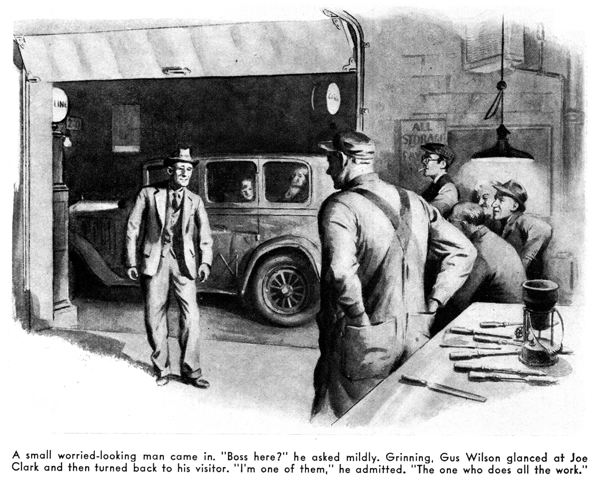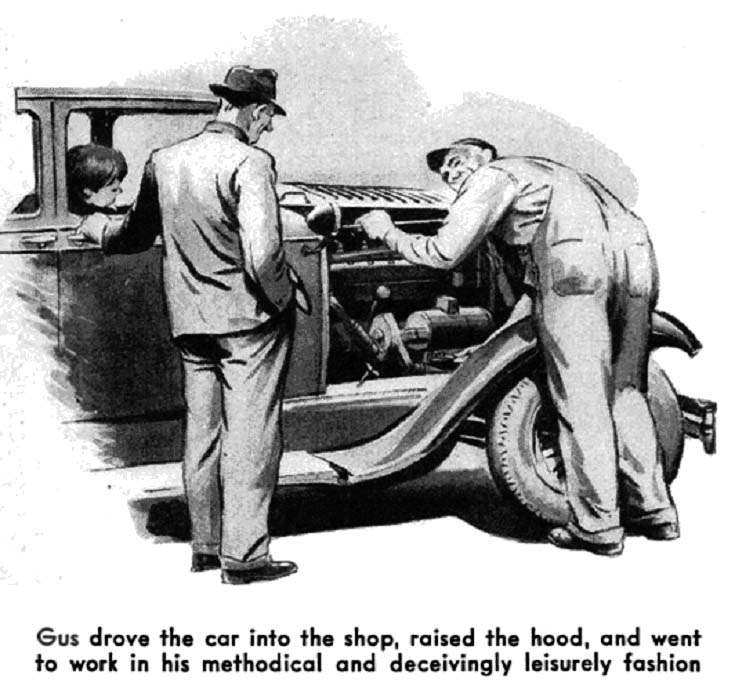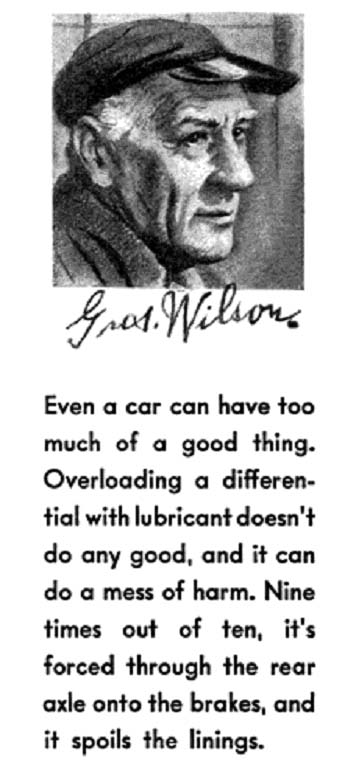March 1939
Gus Says...
DON'T TRUST YOUR EARS
by Martin Bunn

It was a late winter evening during one of those warm spells that give a false hope of an early spring -- one of those evenings when you like to talk about fishing, automobile trips, and summer vacations. So the little group of Gus Wilson's friends and customers who like to congregate in the Model Garage were just "discussing" -- going from one thing to another. By ten o'clock, they had worked around to the subject of the squeaks, squeals, knocks, and other noises which are the occasional by-products of driving an automobile.
Henry Miller, who is strictly a Sunday driver, was holding the floor with a detailed and vivid description of the various weird sounds which had been produced by his car in the course of a trip up to New Haven to visit his wife's family, a description that failed to astonish his hearers, who always are wondering how Henry's bus holds together at all under the punishment that Mrs. Miller gives it. Gus Wilson only half listened while he went ahead methodically with his chore of re-trimming a half dozen soldering irons of various sizes and shapes. The ailments of the Miller car, and their many harrowing symptoms, are old stuff to Gus, who hears much more than he wants to about them from the talkative Mrs. Miller.
As Miller's narrative ended, brakes squealed shrilly outside the shop, and a few moments later a small, worried-looking man came in. Looking from one to another of the group of talkers, he asked mildly, "Boss in?"
Grinning, Gus Wilson glanced at his partner, Joe Clark, and then turned back to the visitor. "I'm one of them," he admitted, "The one who does all the real work!"
The little man smiled nervously and backed away a couple of steps. "I'd like to speak to you," he said.
Gus went to the door with him, and glancing out saw an ancient and battered sedan. "What's the trouble?" he asked.
"I came from Pittsburgh today," the little man told him. "got the wife and two young kids in the back seat. Going on to Boston tonight -- I've got to get there quick because there's a job waiting for me there, and I do need a job.
"Well, when I got near Philadelphia this afternoon, I began to hear noises in the old bus. That wasn't anything new, of course -- she's got over eighty thousand on her, and she always did rattle. But this was the kind of a noise that makes a fellow nervous -- a sort of a low, heavy knock whenever we pulled up a steep hill.
"I got worried, so I went into a garage and told the mechanic about it. He put on the emergency brake, and then raced the motor and let in the clutch until she stalled. Then he said all the main bearings were gone. Wanted twenty dollars to replace them, and said it would take two days. That meant staying over in Phillie, of course, and I just didn't have the money to do it.
"I didn't know what to do. While I was thinking about it, I got to talking to a man who said he knew all about cars. He looked mine over and said the mechanic was right -- main bearings were gone. But he said that if I filled her up with extra-heavy oil, and didn't drive over twenty, maybe I'd make it. So I took the chance.
"She knocked plenty at twenty, whenever we hit a hill. A little way out of Phillie, while we were going up a steep grade in a lot of traffic, a motor-cycle cop came along and started giving me the devil for jamming everything up. I couldn't afford to have any trouble with him, so I had to step on her. Funny thing -- she didn't knock nearly as bad at thirty-five as she did at twenty, and when I got her up to forty she didn't knock at all hardly -- even on the hills.
"So we came along pretty good, and got through New York City without having any trouble. But I had to slow down coming up a hill down the road a piece, and she hammered so hard I thought the motor was coming apart. So, when I saw your sign, I thought I'd better stop in and see if anyone in here would tell me what I oughta do. I can't pay for any big repair job, so if the old bus ain't going to make it to Boston the way she is, I guess I'll have to sell her for junk, and me and the family'll have to go on by bus. I got to be there tomorrow morning, sure."
Joe Clark sometimes accuses his partner of being a soft touch for anyone with a hard-luck tale. But Gus Wilson has been around -- he knows as much about people as he does about cars, and he doesn't make many mistakes about either. Now, the little man's anxious, worried face, and the tired woman and children on the back seat of the worn-out old sedan, told him all he needed to know.
"Sure," he said. "I'll be glad to take a look. I've traveled myself without much in my pocket to do it on. It might be that I could figure out some way of keeping you rolling that won't cost you anything much."
He drove the car into the shop, raised its hood, and went to work in his methodical and deceivingly leisurely fashion. Leaving the engine running, he pressed the clutch pedal down with his hand. "Sometimes you can feel a really bad bearing knock that way," he explained. He speeded up the engine suddenly, and listened to it for several seconds. "Yes, there's a knock all right -- but I doubt very much if it's a bearing knock," he said. "A loose bearing makes a noise like a heavy block of wood falling some distance and striking the ground -- a dull sort of thud. The knock in your engines -- if that is where it is -- is low and heavy, as you said, but I'm pretty certain that it isn't caused by a bad bearing, even if it did sound enough like it to fool that repairman down in Philadelphia. Well, now let's see. I guess using a sounding rod will be the quickest way of locating the trouble."
He went over to his workbench, and came back with a two-foot-long steel rod. Placing is thumb over its upper end, and his ear against the thumb, he began holding the lower end of the rod against various parts of the engine and running gear, listening intently.
"Here we are," he said after a couple of minutes. "It's in the generator," He leaned over and examined the generator, and then laughed reassuringly, "See what's wrong?" he asked the little man. "Your generator is mounted on a pivoted bracket, so that the fan-belt tension can be adjusted. All that's the matter is that it's worked loose, and knocks against the engine block -- mostly when the engine shakes on a low-speed, uphill pull. I'll just tighten up that nut, -- and you can get on your way!"
"Thanks -- thanks, Mister," the little man said in a relieved voice. "But how about your time -- how much do I owe you?"
"You don't owe me anything," Gus assured him, "I've got to be careful about this new-fangled hours-of-labor law. I worked eight hours today, and I'd be breaking the law if I worked any more this evening. I don't want to get Secretary Perkins after me, so anything that I do after regular hours is just for the fun of it. . . . . Oh, that's all right -- that's all right! Good luck to you on the new job!"
After the old sedan had clattered off up the road Gus rejoined his fellow members of the Model Garage Debating Society. "What was the trouble with that fellow's car?" they wanted to know. Gus told them. "Another example of believing too many of the things you hear," he finished.
"I'm always hearing mysterious noises in my car, especially when I have to drive alone at night," young Jack Simpson remarked. "and usually they don't mean anything much, when I get Gus to track them down for me. One night, one of those funny noises almost drove me nuts. It sounded as if a tin pie pan on a string was hanging along the road under the car, and it wasn't anything more important than that little metal plate over the storage battery having worked loose. And another night I heard a terrible thumping noise whenever the car went over a bump. I was dead sure I had a cracked universal -- but it was just a piece of stone that had got itself jammed between the universal casing and the frame of the car."
Ed Zacharias, the weather-beaten old R.F.D. carrier, bore down hard on his end of eating tobacco and then looped a perfect ringer into the waste box under the workbench. "Shucks!" he said. "That wasn't nothing! Why, one day I was driving along in my old car, way out in the country, when all of a sudden there was a shrill, yowlin, noise that sounded like a durn cat cussin' you when you've stepped on his tail. Soon as I threw out the clutch, the yowlin' stopped. 'Dry clutch bearin,' by jingo!' I says to myself, as I nursed the old gal along until I come to a garage, and then I had the clutch greased. After that I drove a couple of miles without any trouble -- and then that yowlin' started in again. So I stopped at another garage, and the feller there said that my clutch was slippin'. He worked on it for a half an hour, and said it was O.K. I drove off -- and then pretty soon the same blamed thing happen again. So I came over here to Gus. He listens a minute, and says: 'slipping clutch, my eyebrow!" And what do you think was wrong? Nothin' but my fan belt so loose that it was slipping part of the time, and the metal of the motor was carryin' the sound around so it sounded like it was in the clutch!"
"I suppose you have a lot of people coming in here with storied about hearing queer noises in their cars, don't you, Gus?" George Knowles asked.
"Sure do," Gus asserted, "And sometimes the queer noises they hear are the result of queerer goings-on in their cars. A couple of months ago, a man came in with a bad knock in his engine. After quite a while I located the cause of his grief -- some one had been careless enough to drop a lock waster into his carburetor!"
"But some of the noises that a car makes are sure-fire symptoms that something is wrong, aren't they, Gus?" Knowles asked.
"No engine noise," Gus replied, "is absolute proof of a particular trouble -- it's just a clue. When you go hunting for the trouble, the first thing to make certain of is that the noise really is being made by an engine part. No one ever did his car any good by doing the wrong repair job on it!"
END
L. Osbone 2019

